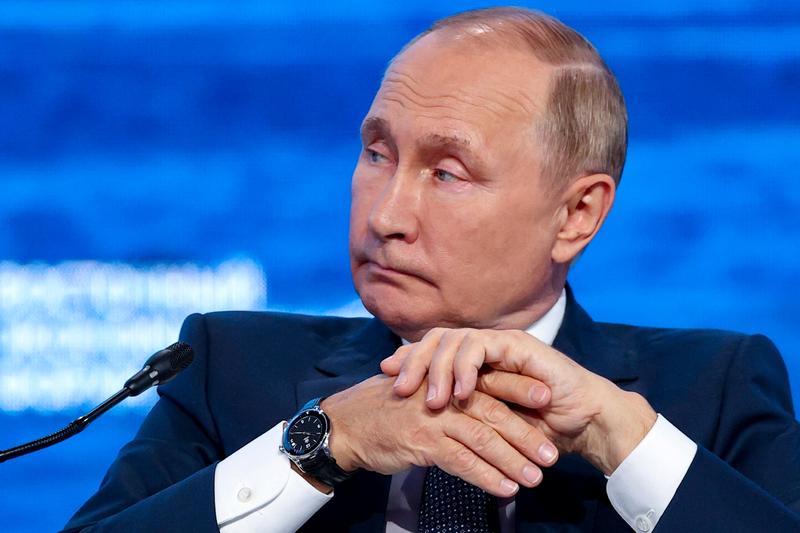
Dmitry Palyuga, elected at the local level in St. Petersburg, estimated that Vladimir Putin no longer enjoys unanimity among the Russian elites. However, he estimated that it will take time before we witness real changes, reports La Libre, as quoted by Rador.
Is the situation changing in Russia? In a situation where the country is experiencing difficulties in the “special military operation” in Ukraine, there is a growing misunderstanding of Vladimir Putin’s decisions in Moscow, according to Dmytro Palyuga, a local representative from St. Petersburg.
“The internal conflict is intensifying in Russia,” he told our BFMTV colleagues.
But, according to the politician, everything will not change from today to tomorrow.
“In Russia, any protest and any disagreement with the official line is suppressed very harshly,” said Palyuga, who was also sentenced to a large fine after calling for the impeachment of the Russian president in September. “It takes a long time for people to be able to change something, and the elites must decide to get rid of Putin.”
But, according to the president of the municipal council of Smolnynsky (district of St. Petersburg), the intentions of the Russian elites are beyond doubt. “They already want to get rid of Putin, but they don’t know how to do it,” he told our BFMTV colleagues.
From Monday, October 10, Russia began a “massive” bombing of Ukraine in response to the explosion on the bridge in Crimea.
“If attempted terrorist attacks on our territory continue, Russia’s response will be tough, and its scale will correspond to the level of threats it poses,” Putin said. On Thursday, October 13, Kyiv suffered again. The capital’s governor estimated that “critical infrastructures” had been achieved.

Vladimir Putin with Sergei Soigu and the Chief of the General Staff of the Russian Federation General Valery Gerasimov Photo: Kremlin Pool / Alamy / Profimedia Images
The Ukrainian counteroffensive changes the situation
Ukraine’s unexpectedly successful counteroffensive, the first since the beginning of the war, caused serious concern and fear among the Russian elite. More precisely: what if Russia really lost?” – asks Foreign Policy
Importantly, these doubts are not so much about the capability of the Russian army or its military power (although that is also a concern), but about the personality of Putin and his ability to control the situation.
Concerns began to pile up, and more and more questions remained unanswered. Will Russia annex the occupied territories? Will annexation referendums be held, and if so, when?
Which Ukrainian regions are annexed? But will she be able to keep them? Where will Moscow find personnel to work in the state administration? Will the Kremlin announce an official military mobilization?
- On the same topic: What Russian elites think about Putin now
The questions are coming, but Putin is silent
He only said that everything is going according to plan and “all the goals of the special operation will be achieved”; perhaps these are the only answers the elite deserve to hear. The Russian information space, from the opposition press to the megaphones of the system, is full of rumours, leaks and speculations that supposedly come from the Kremlin. But nothing sounds convincing and nothing happened.
Putin’s refusal to explain himself, reveal his practical plans and intentions, and respond to concerns and fears is one of the main reasons why his position as a leader is being undermined.
It is one thing to place one’s destiny in the hands of a political leader who is a proven authoritarian leader capable of confronting geopolitical challenges without hesitation. And it’s quite another to find yourself completely dependent on a political leader who looks like he’s about to lose, but stubbornly refuses to explain anything.

Russian President Vladimir Putin Photo: Sergey Bobylev / AP / Profimedia
Putin gave up his annual speech in the spring before the Federal Assembly, the two houses of the legislature met in joint session; indefinitely postponed his Direct Line (a question-and-answer session with ordinary Russians originally planned for the summer); and avoids all topics related to the situation at the front.
He single-handedly started this war and is single-handedly fighting it, leaving the elites with no choice but to blindly follow him and trust his behind-the-scenes discussions with a handful of characters, unknown to the public, as isolated as the president himself. , rador reports with reference to Foreign Policy
Putin’s defeat will hasten his end
Putin consolidated his power and eliminated many factions in the Russian government that could have hindered his rise.
It begs the question: how much could a weakened Putin be removed from power when there are now several levers of governance that would have the power to defeat him?
Unfortunately, the most likely path is a chaotic one, similar to that of 1989, but there is at least one man – Alexei Navalny – who is likely to have enough support in Russia to become a central figure in any attempt to oust Putin.
“If we expect Russian citizens to overthrow Putin, we are doing so in vain, because it will not happen. Russia today in 1937. We in Estonia are afraid of Russia,” said Estonian MEP Jana Toom (Renew Europe group) in Bucharest.
If the war in Ukraine ends badly for Russia, as recent events suggest, and if Ukrainians, as expected, continue to support the West and refuse to negotiate with Putin, mass protests are expected in major Russian cities and, ultimately, the result could be a change in the Russian government. Newsweek.
Read also:
- Why don’t Russians protest for freedom and democracy? Comparison with Iran
- Russia’s Defeats: How the Pro-War Majority Split in Two: Holy War vs. ‘We Can’t Win the War’
Source: Hot News RO
Robert is an experienced journalist who has been covering the automobile industry for over a decade. He has a deep understanding of the latest technologies and trends in the industry and is known for his thorough and in-depth reporting.